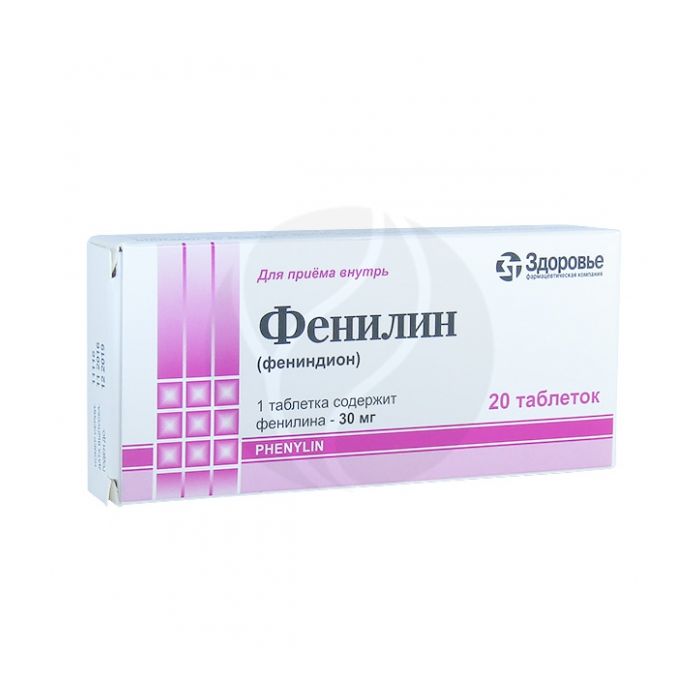Phenilin tablets 30mg, No. 20
Expiration Date: 11/2025
Russian Pharmacy name:
Фенилин таблетки 30мг, №20
Prevention of thromboembolism (including with myocardial infarction, after surgical interventions); coronary thrombosis, thrombophlebitis and deep vein thrombosis of the lower extremities; prevention of thrombosis after surgery for prosthetic heart valves (continuous use).
Inside on the 1st day, the daily dose is 120-180 mg in 3-4 doses, on the 2nd day - 90-150 mg, then 30-60 mg / day, depending on the content of prothrombin in the blood. Cancellation of phenindione should be carried out gradually.
phenindione 30 mg
Hemophilia, hypocoagulation, I trimester of pregnancy, hypersensitivity to phenindione.
pharmachologic effect
Indirect anticoagulant. It causes hypoprothrombinemia associated with a violation of the formation of prothrombin in the liver, it also causes a decrease in the formation of coagulation factors VII, IX, X, a decrease in plasma tolerance to heparin, blood lipids and an increase in vascular permeability. The effect occurs within 8-10 hours and reaches a maximum 24-30 hours after taking phenindione.
Pharmacokinetics
Clinical data on the pharmacokinetics of phenindione are limited. Cumulation is less pronounced than that of neodycoumarin.
Indications of the active substances of the drug Phenilin
Prevention of thromboembolism (including with myocardial infarction, after surgical interventions); coronary thrombosis, thrombophlebitis and deep vein thrombosis of the lower extremities; prevention of thrombosis after surgery for prosthetic heart valves (continuous use).
Side effect
From the digestive system: nausea, diarrhea, abnormal liver function, toxic hepatitis.
From the hematopoietic system: oppression of bone marrow hematopoiesis.
From the urinary system: renal dysfunction.
On the part of the cardiovascular system: myocarditis.
From the side of the blood coagulation system: with prolonged use - micro- and macrohematuria, bleeding from the oral cavity and nasopharynx, from the gastrointestinal tract, hemorrhage into the muscles.
From the side of the central nervous system: headache.
Allergic reactions: skin rash, dermatitis, eosinophilia, fever.
Contraindications for use
Hemophilia, hypocoagulation, I trimester of pregnancy, hypersensitivity to phenindione.
Application during pregnancy and lactation
Contraindicated in pregnancy. Avoid using in the first days after childbirth.
Fenindione should not be used during lactation (breastfeeding).
Phenindione should be discontinued 2 days prior to initiation and should not be used during menstruation.
Application for violations of liver function
The drug should be used with caution in liver failure.
Application for impaired renal function
The drug should be used with caution in case of renal failure.
Use in elderly patients
The drug should be used with caution in elderly patients.
special instructions
The drug should be used with caution in elderly patients, with hepatic and / or renal failure, pulmonary embolism (including in oncology), erosive and ulcerative lesions of the gastrointestinal tract, with pericarditis, in the postpartum period.
Treatment should be carried out under close medical supervision with a mandatory systematic study of the content of prothrombin in the blood and other coagulation factors. General urine tests are systematically performed for the early detection of hematuria.
In some patients, palms are stained orange and urine pink, which is associated with the metabolism of phenindione.
Drug interactions
With simultaneous use with ACTH, the anticoagulant effect is enhanced.
With simultaneous use with dipyridamole, cases of increased bleeding are described, apparently due to a decrease in adhesiveness and platelet aggregation under the influence of dipyridamole.
With simultaneous use with clofibrate, the anticoagulant effect is enhanced. It is believed that fibrates can increase the affinity of oral anticoagulants for the corresponding receptors or, possibly, disrupt the metabolism of anticoagulants.
With simultaneous use with liothyronine, the anticoagulant effect of phenindione is enhanced. It is believed that thyroid hormones can increase the affinity of oral anticoagulants for the corresponding receptors.
With simultaneous use with miconazole, the anticoagulant effect of phenindione is enhanced. The risk of bleeding increases.
With simultaneous use with cimetidine, the anticoagulant effect of phenindione is enhanced due to the slowdown of its metabolism in the liver under the influence of cimetidine, which is an inhibitor of liver microsomal enzymes.
With simultaneous use with ethylestrenol, the anticoagulant effect increases, there is a risk of bleeding.

